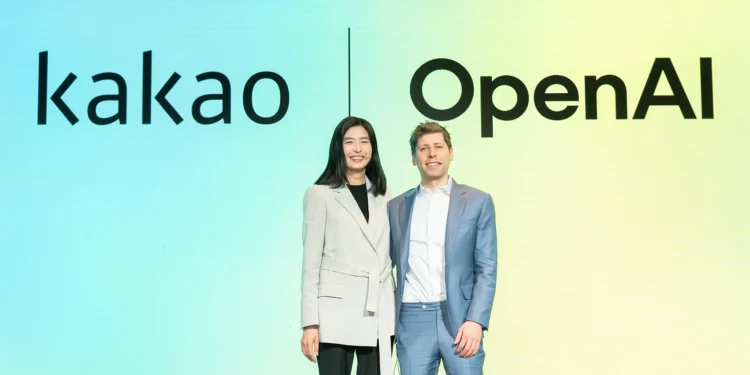South Korean tech giant Kakao has secured a major partnership with OpenAI to integrate ChatGPT capabilities into its popular KakaoTalk messaging platform.
The collaboration gives Kakao access to OpenAI’s advanced language models while providing the American AI company with a gateway to one of the world’s most tech-savvy markets. With 49 million active users, KakaoTalk reaches approximately 94% of South Korea’s population.
OpenAI Expands Asian Presence Through Strategic Korean Partnership
OpenAI CEO Sam Altman personally traveled to Seoul to finalize the deal with Kakao CEO Shina Chung after six months of negotiations. The partnership represents OpenAI’s second major Asian alliance following its joint venture with SoftBank in Japan.
“We’re excited to bring advanced AI to Kakao’s millions of users and work together to integrate our technology into services that transform how Kakao’s users communicate and connect,” stated Kevin Weil, OpenAI’s chief product officer.
The timing proves strategic for OpenAI, which faces increasing competition from Chinese AI company DeepSeek. South Korea offers the highest number of paying ChatGPT subscribers outside the United States, making it an attractive market for expansion.
Kakao’s AI Agent Strategy Targets November Launch
Kakao plans to launch AI-powered virtual assistants by November 2025, designed to perform complex tasks across its digital ecosystem. These AI agents will handle multiple functions including restaurant bookings, calendar management, taxi reservations, and payment processing.
The company already tested its approach with Kanana, a standalone messaging app featuring AI agents Kana and Nana. This beta application demonstrates how OpenAI’s technology integrates with Kakao’s smaller language models for everyday tasks.
“The AI agent will automatically do the work for you and life will be so much better even without knowing what AI is,” explained Chung during an exclusive interview with Forbes Asia.
Strategic Response to Naver’s AI Dominance in Korea
The partnership addresses Kakao’s competitive position against domestic rival Naver, which currently leads South Korea’s AI race with its HyperClova X language model launched in 2023. Naver generates higher revenue at 10.73 trillion won compared to Kakao’s 7.87 trillion won in 2024.
Kakao’s approach focuses on cost efficiency rather than competing directly in AI model performance benchmarks. The company combines OpenAI’s powerful large language models for complex tasks with its small language models for simpler functions, similar to Apple’s strategy with Siri and ChatGPT integration.
Major Infrastructure Investment Supports AI Ambitions
To support its AI initiatives, Kakao announced a 600 billion won investment in June 2025 to build a 92,000-square-meter AI data center in Namyangju city. Construction begins in 2026 with completion scheduled for 2029, adding to the company’s existing Ansan facility.
The expansion demonstrates Kakao’s commitment to AI integration across its diverse business portfolio, which includes online banking, taxi services, music streaming, and e-commerce platforms.
Revenue Growth Potential Through AI-Enhanced Services
Kakao projects potential double-digit sales growth within two years through AI integration. The company expects increased user engagement to drive advertising revenue, which currently accounts for 15% of total revenue.
The partnership also targets Kakao’s commerce operations, which contribute 11% of group revenue. KakaoTalk users exchange an average of 600,000 gifts daily through mobile vouchers, with Kakao earning up to 8% commission per transaction.
AI-enhanced personalization could significantly increase these transaction volumes while improving user retention across Kakao’s super-app ecosystem.
Regulatory Safeguards Protect User Privacy
South Korea’s Personal Information Protection Commission established strict data handling requirements for the partnership. Chat data must remain stored in Kakao-controlled databases and cannot be used by OpenAI for commercial purposes.
These regulations address concerns about sharing sensitive personal information including bank account and credit card details through AI agents. The restrictions ensure Korean user data remains under domestic control while enabling AI functionality.
Market Response Reflects Investor Confidence
Kakao’s stock price surged over 85% in two months following the OpenAI partnership announcement and South Korea’s new presidential AI investment promises. President Lee Jae-myung pledged 100 trillion won in AI investments with supportive measures for domestic internet companies.
The partnership positions Kakao to benefit from South Korea’s broader AI strategy while competing more effectively against both domestic and international technology companies entering the Korean market.














